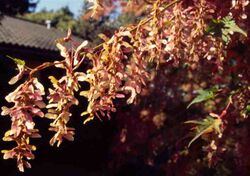Biology:Acer micranthum
| Acer micranthum | |
|---|---|

| |
| Shoot with fruits | |
| Scientific classification | |
| Kingdom: | Plantae |
| Clade: | Tracheophytes |
| Clade: | Angiosperms |
| Clade: | Eudicots |
| Clade: | Rosids |
| Order: | Sapindales |
| Family: | Sapindaceae |
| Genus: | Acer |
| Section: | Acer sect. Macrantha |
| Species: | A. micranthum
|
| Binomial name | |
| Acer micranthum Siebold & Zucc. 1845[1]
| |
Acer micranthum, the small-leaved maple,[2] is a species of flowering plant in the family Sapindaceae in the snakebark maple group, native to Japan , on Honshū, Kyūshū and Shikoku. Its Japanese name is the Komine maple (Japanese: コミネカエデ Hepburn: Kominekaede).[3][4][5][6][7][8][9]
It is a small, sometimes shrubby tree growing 6–10 m (20–33 ft) tall, with slender, arching branches. The bark is smooth and striped at first, becoming rough and dull grey on mature trees. The shoots and winter buds are dark purple-red. The leaves are 4–10 cm long and 2–8 cm broad, palmately lobed, with five deeply toothed lobes with long acuminate tips and double-serrated margins, and with distinctive tufts of orange-red hairs in the main vein axils at the base of the leaf; the petiole is 2–5 cm long. The leaves emerge red in spring and turn shades of yellow, orange and red[2] in autumn. The flowers are produced in early summer in racemes 4–10 cm long, each flower 4 mm diameter, with five yellow to greenish-yellow sepals and petals; it is dioecious, with male and female flowers on separate trees. The fruit is a paired samara with two rounded nutlets, each with a wing 1.5–2 cm long; the two wings spreading almost horizontally from each other.[3][4][5][6][8][10][11]
It is most closely related to Acer tschonoskii, which replaces it further north and at higher altitudes in Japan; they have very similar leaf form.[8]
Acer micranthum is cultivated as an ornamental tree in European and North American gardens, and has gained the Royal Horticultural Society’s Award of Garden Merit.[2][12] Though hardy down to −20 °C (−4 °F), it requires a sheltered position in neutral or acid soil with sun or partial shade.
-
Tree in cultivation, Denmark
-
Leaves, Rogów Arboretum, Poland
-
Illustration by Siebold & Zuccarini
References
- ↑ The International Plant Names Index
- ↑ 2.0 2.1 2.2 "Acer micranthum". RHS. https://www.rhs.org.uk/Plants/212/Acer-micranthum/Details. Retrieved 26 September 2019.
- ↑ 3.0 3.1 Kobe city: Acer micranthum (in Japanese; google translation)
- ↑ 4.0 4.1 Kanagawa Prefecture trees and shrubs: Acer micranthum (in Japanese; google translation). Archived 2009-10-24.
- ↑ 5.0 5.1 Okayama science university: Acer micranthum (in Japanese; google translation)
- ↑ 6.0 6.1 Kanon tree book: Acer micranthum[yes|permanent dead link|dead link}}] (in Japanese; google translation)
- ↑ Maple World: Maples of Japan
- ↑ 8.0 8.1 8.2 Maple World: Komine-kaede
- ↑ {{citation | mode = cs1 | title = Acer micranthum | work = Germplasm Resources Information Network (GRIN) | url = | publisher = [[Organization:Agricultural Research ServAgricultural Research Service (ARS), United States Department of Agriculture (USDA) | access-date = 16 January 2018 }}
- ↑ Ishikawa prefecture forestry research institute: Kominekaede (in Japanese; google translation)
- ↑ Kota's Nature Photo Gallery: Acer micranthum (in Japanese; google translation)
- ↑ "AGM Plants - Ornamental". Royal Horticultural Society. July 2017. p. 1. https://www.rhs.org.uk/plants/pdfs/agm-lists/agm-ornamentals.pdf. Retrieved 18 February 2019.
Wikidata ☰ Q1631932 entry
 |




